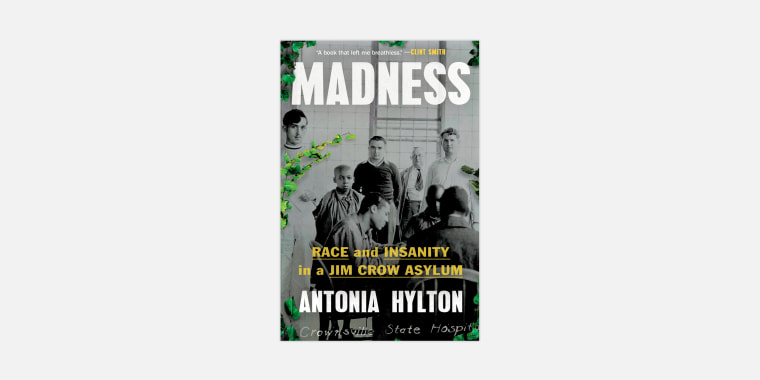The name of a Harvard University lecture called to first-year student Antonia Hylton: “Madness in Medicine.” The 2011 lecture delved into the development of modern psychiatry.
Hylton said that, immediately “hooked” on the topic as she continued her studies in history and science, she noticed that Black people were absent in the historical accounts she read about mental illness.
Determined to learn more, Hylton embarked on an independent exploration that led her on a decadelong mission, combing through often obscure archival research and collecting oral histories from the surviving patients and employees of mental health facilities.
Along the way, Hylton unearthed the stories of some of her own family members whose lived experiences with mental trauma had caused generational stigma and shame.
Those true-life tales are rigorously reported and tightly interwoven in Hylton’s first book, “Madness: Race and Insanity in a Jim Crow Asylum” (Legacy Lit/Hachette Book Group), published Tuesday. Hylton is a correspondent for NBC News and MSNBC.

In its 368 pages, the story of Crownsville Hospital — formerly known as the Maryland Hospital for the Negro Insane — unfolds.
“Madness” takes readers back to a cold day in March 1911, when officials marched a dozen Black men into the heart of a Maryland forest. The men were forced to clear the land, pour cement, lay bricks and harvest tobacco. When construction finished, they became the hospital’s first 12 patients.
As it evolved from a work camp into what was practically a small city set on 1,500 acres, the infamous institution became a microcosm of battles over slavery, racial integration and civil rights. At its peak, the hospital’s population overflowed with 2,700 patients.
The institution shuttered in 2004; the remaining records documenting the sprawling campus and its patients “tell us a uniquely American story,” Hylton writes.
NBC News recently spoke with Hylton via Zoom. The interview has been edited for length and clarity.
NBC News: You shared that your journey of writing the book took a decade.
Antonia Hylton: I spent countless hours researching and reading the minutes, letters and other documents of officials at Crownsville Hospital. Then I realized that even with surviving records, oral history, in the African and diasporic tradition, was needed. The book weaves the testimony of more than 40 former patients and employees of Crownsville, with records that were preserved at the Maryland State Archives and others that had been kept in the homes of former staff members. I also read articles from historic Black-owned newspapers and mainstream publications.
NBC News: What stood out for you while poring over the records?
Hylton: What I discovered left me dumbfounded, and there were a roller coaster of emotions. There were times when I cried. The doctors wrote incredibly racist things about their patients. They were called racial slurs. There were horrible incidents of mistreatment in clinical settings and day to day.
In 1923, according to the Baltimore Afro-American newspaper and other accounts, one patient got into a disagreement with a younger guard who taunted him and covered his mouth with sticky flypaper. The patient removed the paper and returned the favor, but as he walked away, the guard warned him, “I am going to teach you a lesson.” That night, he dragged the patient down to the hospital basement and bludgeoned him with a bat. His face was barely recognizable. He drew his final breaths on a table in the hospital infirmary.
NBC News: The book notes that by the end of the 20th century, asylums faded from view, but prisons and jails increasingly became de facto treatment facilities for those within its populations grappling with mental illness.
Hylton: My wish is that “Madness” will help us understand both our current, broken mental health care system and our carceral one. Ultimately, the history of Crownsville provides a window into the past and future of mental health care for Black Americans and all.
NBC News: What other takeaways do you hope the book will provide about mental health?
Hylton: I think we have to listen more and have judgment-free discussions. Every American, from every walk of life, can identify with some anguish that they or their loved ones have faced. During the pandemic, we saw that some people struggled with depression, anxiety, loneliness and substance abuse. And the data is telling us that young people are very concerned about the state of the world and systems that put their futures at risk. All of it can have a real impact on mental well-being. We cannot afford to put our heads in the sand. We must do something that sets us up for a better future.
For more from NBC BLK, sign up for our weekly newsletter.
